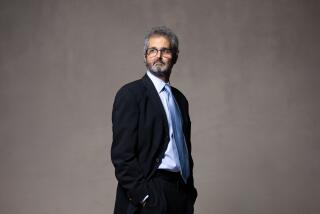Defender of Unpopular Causes and Clients
- Share via
Fred Okrand got his career start from a leaflet left on a bus seat when he was a USC law student in the late 1930s.
The pamphlet was about the American Civil Liberties Union, and little did he know that representing the organization would put him in the midst of some of the biggest court battles ever to come through Los Angeles.
Okrand became associated with the ACLU in 1941, and the following year represented Japanese Americans imprisoned in relocation camps. After returning from a tour of duty in the Army in World War II, he again fought for the rights of Japanese Americans in relocation camps.
In later ACLU cases, he defended Jehovah’s Witnesses’ right to hand out religious pamphlets, teachers who refused to sign loyalty oaths on their job applications during the McCarthy era and minority students who wanted to be bused to white schools and better educations.
In an interview with The Times in 1984 he said the busing case was his “greatest judicial disappointment.” For 20 years he fought to have inner-city students bused to less-crowded schools in the San Fernando Valley, only to have the California Supreme Court refuse to grant a hearing on the issue.
In 1951, Okrand settled with his wife, Mimi, and two sons, Marc and Dean, in a house in a section of Van Nuys that later became part of Sherman Oaks.
Since most of Okrand’s work for the ACLU was pro bono, he supported his family by taking cases with unsympathetic defendants. He and longtime partner Albert Wirin represented such reputed gangsters as Frank Carbo, Mickey Cohen and Louis Dragna on charges that included fight fixing and racketeering.
In 1972 he took a paid position with the Los Angeles ACLU, becoming its first legal director. He held the post until retiring in 1984, when the organization named him legal director emeritus.
Despite his retirement, Okrand, now 80, still works.
Okrand said the principles of the Constitution should be of utmost importance to Americans today.
“The law is the backbone of any society; the alternative is anarchy,” he said. “Ours is so magnificent and so wonderful, it should be respected instead of downgraded.”
More to Read
Sign up for Essential California
The most important California stories and recommendations in your inbox every morning.
You may occasionally receive promotional content from the Los Angeles Times.













